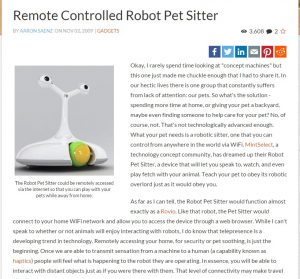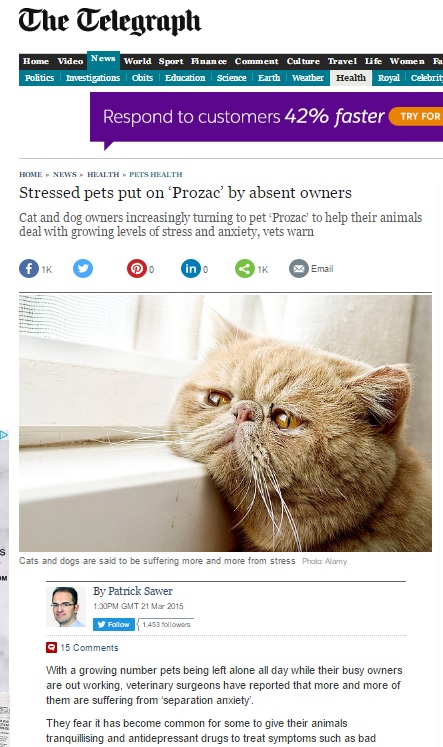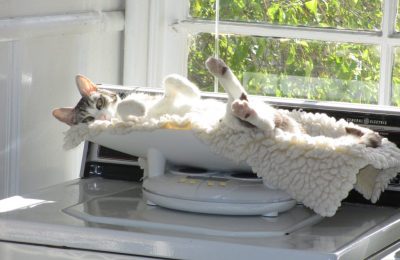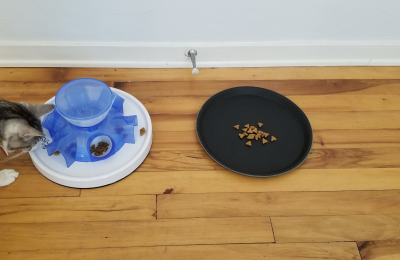More people than ever claim that they feel that their pets are part of the family. We let them sleep with us in our beds, we buy gifts for them, we feed our cats and dogs expensive “all natural” food, and we carry pictures of them in our wallets (or at the very least, in our cell phones). Yet humans feel busier than ever, are working longer hours, and are experiencing a lot of behavior problems with their pets.
[snap url=”http://www.bbc.com/news/business-23183384″ alt=”My Thumbnail” ]
 Technology to the rescue! Many Kickstarter fund requests these days are geared toward making your life as a pet parent “easier:” remote monitors that allow you to talk to your pet from work; various forms of feeders that allow you to dispense food to your pet using your cell phone; automatic toys for cats and dogs; and no newbie to the tech scene, the automatic litterbox has been around for at least 20 years. And the future will bring us dog-walking robots and robotic pet-sitters!
Technology to the rescue! Many Kickstarter fund requests these days are geared toward making your life as a pet parent “easier:” remote monitors that allow you to talk to your pet from work; various forms of feeders that allow you to dispense food to your pet using your cell phone; automatic toys for cats and dogs; and no newbie to the tech scene, the automatic litterbox has been around for at least 20 years. And the future will bring us dog-walking robots and robotic pet-sitters!
These “gizmos” may on the surface make your life a little easier – but are they good for our pets? And what do they say about our relationship with our animals?
 I started thinking about this topic when I did a consultation with some clients who had both an automatic litterbox and an automatic food dispenser for their cat. They said they liked the convenience of the self-cleaning litterbox because they could go away for three or four days and not have to have someone come over to care for the cat (Guess who didn’t like the convenient automatic litterbox? The cat). I tried to hide my horror for this poor, young, highly social cat who would frequently be left alone for long weekends without any social interaction or attention. People frequently describe cats as “low-maintenance” or “independent,” and it might not occur to them that there would be any problems or risks in leaving a cat alone for a few days.
I started thinking about this topic when I did a consultation with some clients who had both an automatic litterbox and an automatic food dispenser for their cat. They said they liked the convenience of the self-cleaning litterbox because they could go away for three or four days and not have to have someone come over to care for the cat (Guess who didn’t like the convenient automatic litterbox? The cat). I tried to hide my horror for this poor, young, highly social cat who would frequently be left alone for long weekends without any social interaction or attention. People frequently describe cats as “low-maintenance” or “independent,” and it might not occur to them that there would be any problems or risks in leaving a cat alone for a few days.
Other people just don’t want to clean the litterbox. In fact, the litterbox is a big reason people wouldn’t adopt a cat (even if they had cats in the past). A dirty litterbox is a big problem for cats – so shouldn’t I be happy about something that leaves cats with a clean box to use? And if the cat gets their food while the owner is gone, what’s the big problem?
My distaste comes from a few sources: one reason is that I don’t think people should be leaving their cat alone for extended periods. The general consensus among experts is that cats should not be left alone without someone physically checking on them for more than ~24 hours. Why? Sicknesses or injuries can happen, and happen quickly. Your cat could spill her water dish and be left without water until you get back. A few days could be a lifetime for a suffering cat.
Furthermore, cats need social attention – most pet cats enjoy some level of human company, be it interactive play, cuddling, sitting next to you on a couch, or just hearing a gentle human voice. Very social cats NEED these types of attention. Indoor cats have a small world, and are sensitive to changes in their daily routine. Such changes in routine have been linked to sickness behaviors in cats (including vomiting and cystitis). So when you are gone, anything your pet sitter can do to maintain a cat’s daily routine, including attention and play, will help ward off stress.
My second source of disdain for technological gadgets that do the “care-taking” is that those “chores” are part of being an educated, aware pet-parent. When you clean the litterbox, you know exactly how much your cat eliminates each day – and when something changes. More or less urination or defecation can indicate sickness. When you clean the box every day, you know if your cat has diarrhea, and whether they cover their waste. When you give your cats an automatic litterbox, you give up a lot of information. The same is true for using automatic feeders (especially the kind that is continually dispensing food) – pet guardians become unaware of how much or even whether an individual cat is eating.
My third reason for disliking pet gadgets is that cats often do not like them; while they may use them, if given a choice most cats would likely prefer something less “wired.” And if they DON’T use them, we’ve got big problems on our hands. A lot of cats have problems with automatic litterboxes: the noise of the mechanism scares some cats; the rakes of the box get dirty and smelly; given the huge size of the box, most of it houses the motor, and there is actually very little space for the cat to eliminate in. Automatic toys may help provide extra mental stimulation for some cats, but as play is also an important way for cats to bond with their humans, these toys should supplement, not replace interactive play with wand toys.
 This topic of pet neglect brings up lots of mixed feelings for me – obviously people keep pets for a reason, usually because of the happiness they bring to us. But is pet-keeping actually good for the pets? I often feel there’s plenty of evidence to the contrary. In addition to an increase in gadgets that replace human care, we see more pets on psychotropic medication for behavior problems that are probably at least in part caused by human neglect, whether that neglect is intentional or not.
This topic of pet neglect brings up lots of mixed feelings for me – obviously people keep pets for a reason, usually because of the happiness they bring to us. But is pet-keeping actually good for the pets? I often feel there’s plenty of evidence to the contrary. In addition to an increase in gadgets that replace human care, we see more pets on psychotropic medication for behavior problems that are probably at least in part caused by human neglect, whether that neglect is intentional or not.
But if people don’t want to clean litterboxes, is it better for cats to have an automatic litterbox than to be homeless (or killed in a shelter)? And my answer would be – if you could make it awesome, then yes; and if the cats would use it, then yes. Unfortunately, litterbox avoidance (often caused by human litterbox negligence) is a big killer of cats. In my perfect world, people wouldn’t see these pet-chores as a burden, but instead as part of the responsibilities of caring for another living being.



